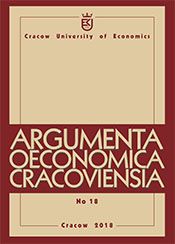Fiscal Policy Effects in Ukraine
Fiscal Policy Effects in Ukraine
Author(s): Viktor Shevchuk, Roman KopychSubject(s): Economy
Published by: Wydawnictwo Uniwersytetu Ekonomicznego w Krakowie
Keywords: fiscal policy; output; interest rate; real exchange rate; Ukraine
Summary/Abstract: This paper empirically analyses fiscal policy effects in Ukraine using different identification strategies within the framework of a vector error correction model (VECM). For quarterly data from 2001 to 2016, we find a robust positive impact of both government expenditure and net revenue upon output in Ukraine, which closely corresponds with the predictions of the Mankiw-Summers model in the case of high demand for money in relation to consumption expenditure combined with significant investment elasticity in relation to the interest rate. In other respects, the fiscal policy transmission mechanism exhibits several standard features (such as an increase in government expenditure after a positive shock to revenue or a widening of the budget deficit following an interest rate hike). The results suggest the feasibility of revenue-based fiscal consolidation policies in Ukraine, as better tax collection may contribute to economic growth even in the short run. Since there is a robust conventional inverse relationship between interest rate and output, one of the puzzling results is that government expenditure puts downward pressure on the former, with net revenues being neutral in this respect. Real exchange rate (RER) depreciation is behind the decrease in output in the baseline model, but alternative identification schemes suggest that it is likely to be contractionary in the short run while turning expansionary in the long run.
Journal: Argumenta Oeconomica Cracoviensia
- Issue Year: 2018
- Issue No: 18
- Page Range: 33-50
- Page Count: 18
- Language: English

